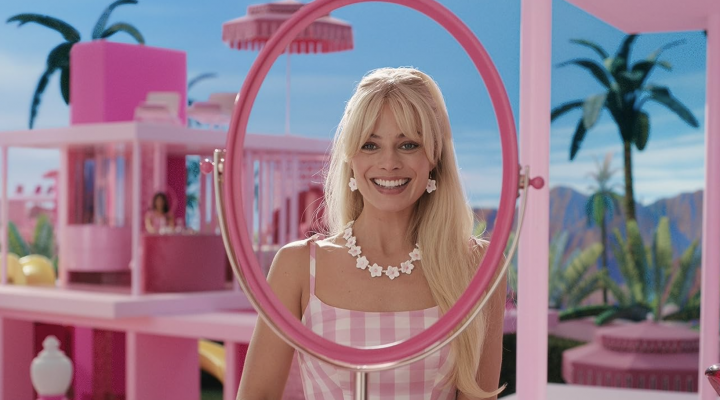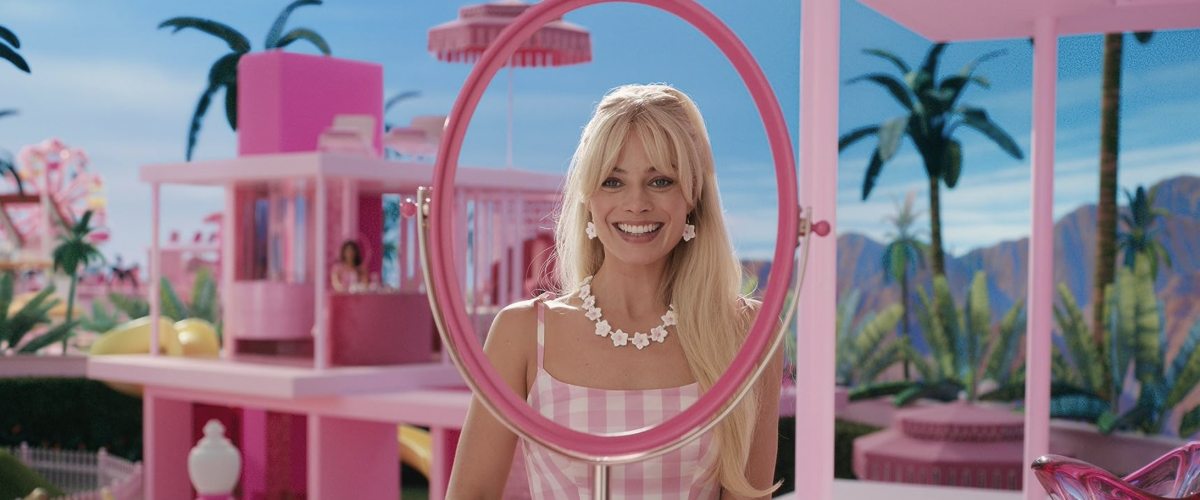Toward the end of last year the phrase “Year of the Doll” became popular officially through a New Yorker podcast and unofficially on many social media platforms as people noticed the massive cultural effect from the Barbie movie and Taylor Swift’s Eras Tour.
The Eras Tour has been estimated to be the highest grossing tour of all time with about 72,000 people in attendance per show and an estimated 4.35 million tickets sold throughout the tour.
Barbie was the highest-grossing movie of 2023, the highest-grossing Warner Bros. movie ever and one of the highest-grossing movies of all time. Last year’s headlines emphasized that Barbie surpassed even The Avengers at the box office.

Laura Ellis
The idea that a movie about a doll — a toy of girlhood — and an outrageous celebration of pastels, beauty, female empowerment and so much pink could possibly outdo a movie about superheroes taking down a bad guy of mythic proportions is unheard of. Everyone was shocked when this unmatched affirmation of girls’ and women’s interests beat the draw to watch beloved characters following a stereotypically masculine plot.
Barbie backlash
In response to its success, all this unprecedented celebration of women’s interests led to a backlash when critics branded the movie and the tour as unimportant, silly and frivolous.
Barbie was famously snubbed at Oscars this year. While it won the award for Best Original Song, it did not even receive nominations for Best Picture, Best Director for Greta Gerwig or Best Lead Actress for Margot Robbie. This overlook did not go unnoticed and was met with outrage in popular culture. Many on social media joked that by withholding nominations for these women, the Academy literally proved right the point of the movie.
Barbie is seen as fun but ultimately not as impactful as other films.
Despite the cultural shift following the movie and its wild popularity by millions, particularly women, Barbie is seen as fun but ultimately not as impactful as other films. While Barbie was popular, it is not critically significant because its popularity is defined and claimed by women.
Historically, there’s a trend of diminishing and downplaying the validity and value of women’s interests. And a movie about a woman with existential questions and a journey toward her empowerment was labeled not as important as a movie about a man making a bomb.
For the record, I personally loved Oppenheimer and I understand why it swept the Oscars with awards. It’s the kind of serious, dark and male-centric movie that was made to win awards.
How we look
Many people have been talking about the black gown Margot Robbie wore to the Oscars. In comparison to the bright pink looks Robbie wore throughout the entirety of the Barbie tour, the black was startling. Many dubbed the dress as an “RIP to Barbie” on awards night.

Margot Robbie attends the 96th Annual Academy Awards on March 10 in Hollywood. (Photo by Emma McIntyre/Getty Images)
While the color could represent the end of the Barbie chapter, I was struck by how serious it looked in comparison to Robbie’s formerly bright, playful looks. After the Academy rejected Barbie’s playful movie motifs as worthy of critical acclaim, the dark gown seemed like the perfect response. It was the kind of simple, classic look the Academy demands of women if they want to be taken seriously.
The church, too, demands women look a certain way in order to be taken seriously.
I’ve heard female pastors talk extensively about how to dress for their jobs. They must look modest but not too modest. They can’t look too feminine because they won’t be taken seriously, but if they dress too masculinely, they’ll be accused of looking like they were trying to dress like a man. They have to think through things like where they’ll be able to clip a microphone made for men’s pants and lapels onto their clothes.
I’ve listened to female pastors talk about their hyper-awareness of the smallest choices — such as their lipstick and nail polish color — not picking what they normally like, but a color that will lead to the least number of comments. How many male pastors do you know who go into this much thought when they throw on pants and a shirt on a Sunday morning?
I know very few female pastors who feel comfortable expressing their femininity to its fullest while in their roles. They must dampen their authentic selves in order to be more palatable to their congregations.
Women are simply taken less seriously when they present as overtly femme. The idea that a woman would love the color pink and also have pastoral, theological or even just generally serious thoughts? Inconceivable.
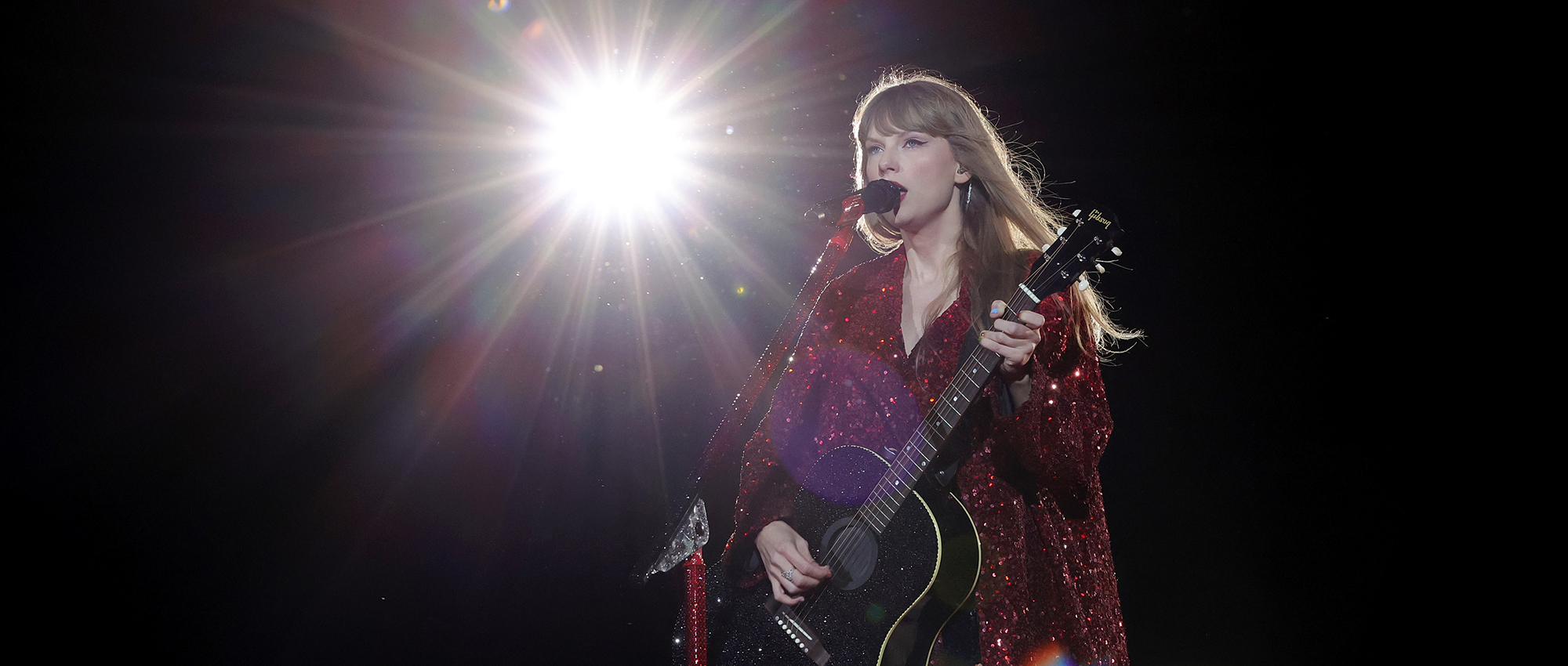
Taylor Swift performs onstage during “Taylor Swift | The Eras Tour” at MetLife Stadium on May 27, 2023, in East Rutherford, N.J.. (Photo by Kevin Mazur/TAS23/Getty Images for TAS Rights Management)
Women taken less seriously
In general, the things women like are often not taken seriously by society. Women’s interests and hobbies are seen as frivolous, whereas the things men like are rarely ever defined in those terms.
The friendship bracelets and concert outfits of the Eras Tour were infantilized by critics and seen as delusional and crazy. Those same critics have no such qualms when a male sports fan paints his face and wears a jersey to a game.
One is ridiculous and childlike. The other is standard practice — just boys being boys.
Alternatively, sometimes when women’s interests gain too much power, they are seen as an unknown evil. People look at the predominantly female crowd at an Eras concert and say it’s like a cult. People look at the predominantly male crowd of a sports game and call it unifying.
Although her music is not political, Taylor Swift is being demonized in political circles simply because some people are threatened and afraid of what a woman might do when she gains too much power and too big of a following.
A poll from Monmouth University showed one-fifth of Americans believe in a conspiracy theory that Taylor Swift is working to fix the 2024 presidential election in Joe Biden’s favor. And 83% of Americans who believe in this theory plan to vote for Donald Trump; 73% of them believe the 2020 election was fraudulent.
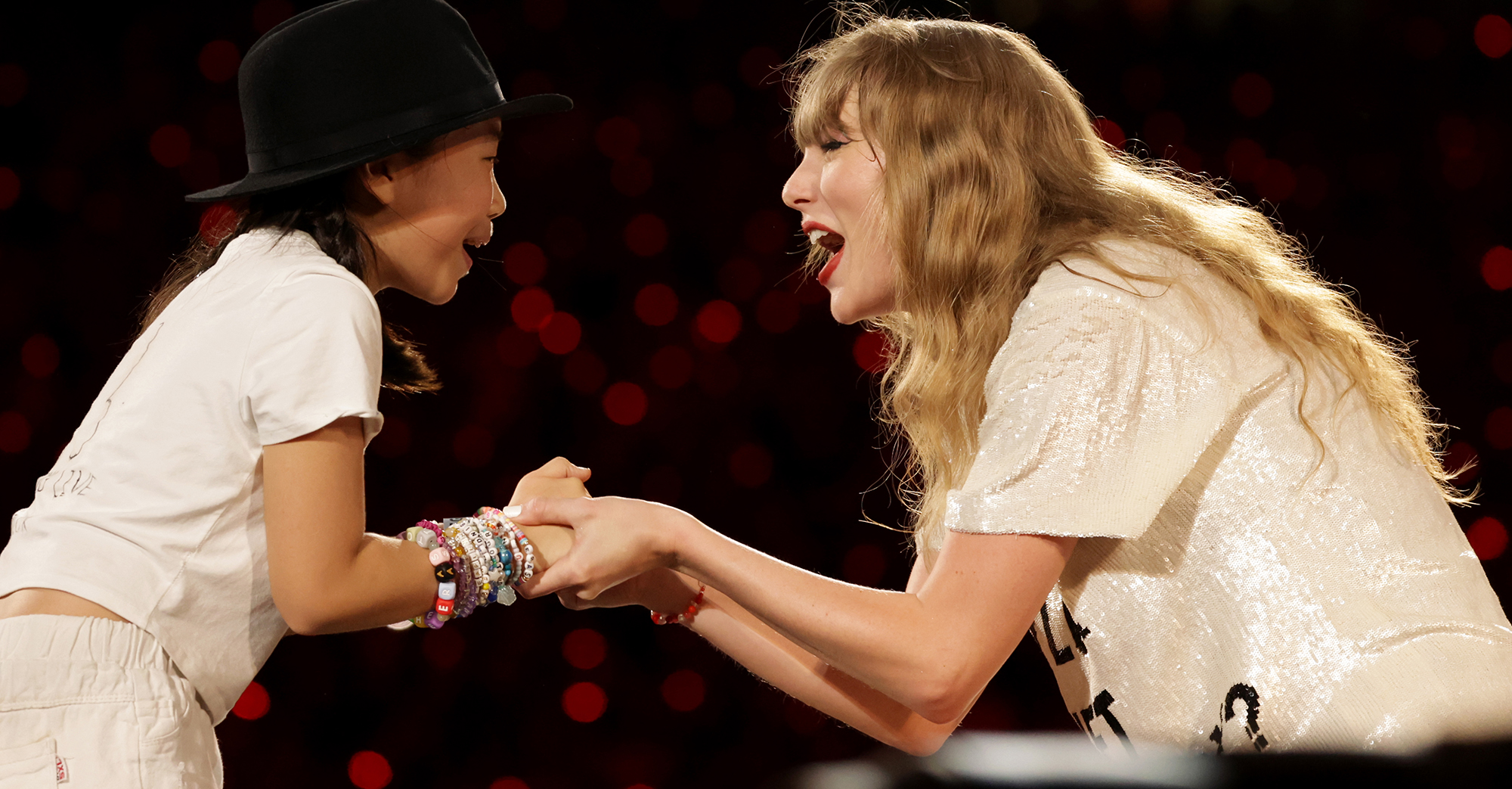
Taylor Swift performs during “Taylor Swift | The Eras Tour” at the National Stadium on March 02, 2024, in Singapore. (Photo by Ashok Kumar/TAS24/Getty Images for TAS Rights Management)
Emotional safety
At the height of the Eras Tour, I saw so many social media posts from friends and unknown influencers who said something along the lines of, “I’ve never felt so safe in a public place as I did at the Eras Tour,” or “This is the most supportive group of people I’ve ever been around.”
Every day, women move through the world with a heightened sense of awareness about their physical safety in any given place. We hold our keys a certain way when we walk to our cars, we don’t go for runs after dark, in a room full of men we feel instantly safer when another woman walks through the door. In a stadium full of predominantly women, women feel safe. The liberation of not worrying about physical safety in a public place is such a rare gift.
“The Eras Tour represented an emotional safety for many women and girls.”
Beyond literal physical safety, the Eras Tour represented an emotional safety for many women and girls who could literally and metaphorically scream about their interests in a space where no one was rolling their eyes in response to shared friendship bracelets. Their neighbors did not tell them they were being too loud. They were not met with the condescension that their personal interests were trivial. And they did not have to tone down their genuine passion of their interests for the comfort of those around them.
There’s an important public embrace of female empowerment in the popularity of Barbie and the Eras Tour. There’s also a more subtle but just as significant cultural movement that claims the things women like are worth unabashedly celebrating.
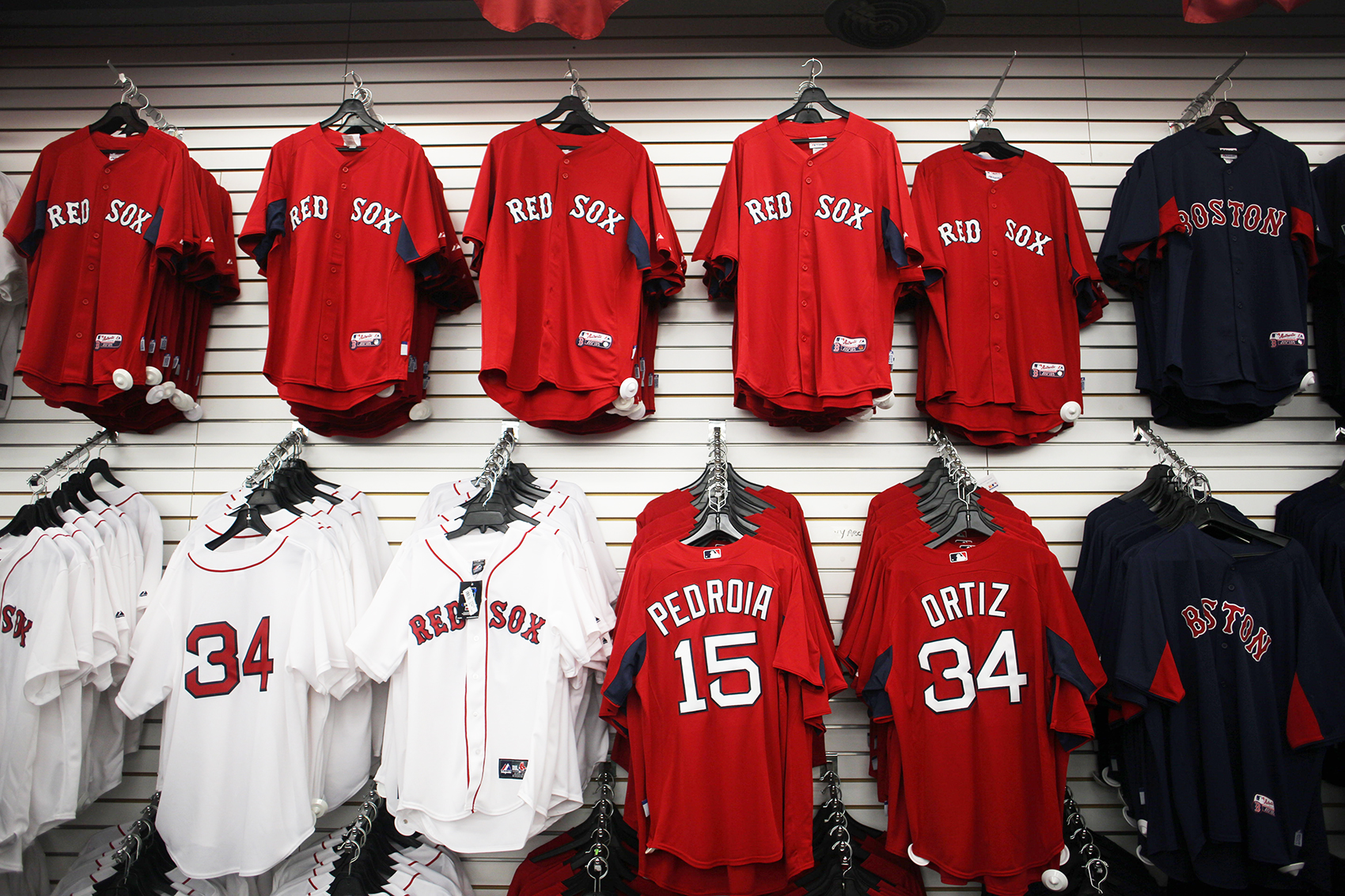
(Photo by Tim Clayton/Corbis via Getty Images)
Diverse interests
While Barbie and the Eras Tour clearly lean into embracing the stereotypical, women have many diverse interests that are not always or only clichéd femme things. I, for example, both love the color pink and am a huge baseball fan.
I used to live in Boston and one day when I was wearing a Red Sox shirt, a man said to me, “I bet you can’t name three players!” I actually can name three players, but that’s not the point.
I know several women who have had similar experiences from male strangers who happened to be in their vicinity and felt the need to ask the woman to prove her devotion to a hobby stereotypically enjoyed by men.
One woman on Instagram shares about a similar experience she had on a date. When the man told her he loved football, she responded that she was not really a football fan but that her roommates love the Eagles and she’s seen a few games with them. In response, her date told her to name even one Eagles player.
She replied, “I can’t name a single football player on the Eagles team. Like I said, I don’t like football. I like fantasy books. Can you name a single fantasy book? … Can you name me a type of embroidery stitch? Can you name me a recipe your mother taught you when you were 8 and you’ve never forgotten? Can you name me a current fashion trend among young women aged 18 to 34? No? I don’t expect you to know about my hobbies, so why do you expect me to know about yours?”
There’s an assumption that women don’t know anything about the things men like, and when this is proven true, women are seen as ill-informed for not enjoying the same hobbies as the men in their orbit. On the same hand, women’s own hobbies are often not seen as valid or valuable — and certainly not worth learning about.
“This trend expands to the church when ‘women’s issues and concerns’ are relegated to a women’s ministry, led by pastors who can’t call themselves pastors.”
This trend expands to the church when “women’s issues and concerns” are relegated to a women’s ministry, led by pastors who can’t call themselves pastors because they are women.
Even when there’s not a separate women’s ministry in a church, and women are permitted to be called by the same titles as men for doing the same job, there are often events solely held and led by women (just as there are events solely held and led by men). I’ve seen these women’s events announced from the pulpit by a man, and often the event is minimized through humor. “I’m sure there will be lots of chatting, and I plan to stay far away from the fellowship hall on that day.” Cue laughter from congregation.
I had a seminary professor who once joked about what he called the “penis proximity principle.” While visiting a Baptist church, he noticed that anytime a woman ascended the stairs to speak to the congregation on the church platform, a man — not always the same one — would always come to hover behind her, as if her words only held validity through her proximity to a male presence.
When women’s interests, hobbies and concerns come too close to the forefront, they are minimized and pushed aside, only finding societal validation through male approval. Or when these interests fly too high, their status and visibility are controlled and suppressed.
Was 2023 really that good?
Culture is reactive, and new trends are often born in response to something that came before. Jim Crow laws followed the abolition of slavery. The Hippie movement of the 1960s followed the family values movement of the 1950s. Trump was elected after this country’s first Black president. All these are obviously complicated points in history, born of the many influences of the times. When one side of society gains too much power, the other side often responds.
So after the Year of the Doll, I’m not surprised to see so many plastic doll heads lying limp on the pavement as culture responds by attempting to reject the validity of women’s hobbies and empowerment. I’m not surprised when I hear people say negative things about the Eras Tour and when I read statistics about a new conspiracy theory surrounding a powerful woman. I’m not surprised when Barbie was snubbed by critics and peers. I’m not surprised when women in their jobs and everyday lives feel the need to downplay their interests and personalities for the sake of men’s comfort.
“When one side of society gains too much power, the other side often responds.”
I appreciate that 2023 was named the Year of the Doll and not the year of the woman. 2023 was a year of rebellion against the narrative that women’s interests don’t matter. It was a fun, unapologetic, fantastic glitter explosion of all things femme that was wildly popular and accepted and celebrated by millions of women, which is incredibly radical in its own right.
I, too, celebrate this movement of embracing women’s interests, and I don’t want to diminish the effect it has on women’s rights and visibility in this country. At the same time, I wouldn’t describe 2023 as a good year for women.
It was the first full year after Roe was overturned, limiting millions of women’s access to health care. The pay gap persists as women continue to earn only 82 cents to the dollar compared to men, and women of color earn even less. Last year, 41% of women stated they had experienced sexual or physical violence in their lifetime.
In the Baptist world, the Southern Baptist Convention ousted churches over the issue of women in leadership, which of course was a reactive cultural moment of its own. And based on 2021 data, only 7.4% of Cooperative Baptist Fellowship churches have women pastors or co-pastors.
The 2024 pushback against the Year of the Doll is not a rejection of the year of the woman. It is a pushback against the embrace of a toy of girlhood. 2023 did not hold extreme, systematic, policy-based change for women. It was simply an increased visibility of women’s interests. And many critics couldn’t understand or accept even that much empowerment for women and girls.
Relearning and rediscovering
I recently have rediscovered my love of bright colors and flowers, which might sound strange to some. How could I forget I like something? But many girls in a desire to grow up recognize the world rejects femme colors, decorations, clothes and personalities if they are to be serious and successful members of society. In response, many girls are conditioned to unlearn their own interests and tastes in order to be heard. It is only in adulthood that many of us remember we like those things.
After a stint of unexpected illness a couple of years ago, I pretty much only left my apartment to go to doctors’ appointments or the pharmacy. My world was very small that year, so every time I went to the pharmacy, I’d buy myself a new nail polish, getting bolder and brighter in colors each time. I wasn’t able to leave my apartment and enter serious society, so why not? Through my year of nail polish, I was reminded how much I like bright colors and things that sparkle.
When I watch women and particularly young girls’ reaction to the Barbie movie and the Eras Tour, I feel so much hope and joy at their sheer abandon of passion and their boldness to learn and relearn the practice of embracing their authentic selves.
“On the issue of emphasizing or even noticing women’s interests, concerns and passions, the church is predictably behind American culture.”
As far as the progression for social justice goes, the church is unfortunately almost always behind popular culture, holding on to tradition in order to support things like slavery, segregation, misogyny and homophobia for longer than the majority of society and the workplace hold such views. And on the issue of emphasizing or even noticing women’s interests, concerns and passions, the church is predictably behind American culture.
And yet I pray for a church where girlhood moments and girly things are celebrated and seen as sacred, so that women can step into the fullest versions of their authentic selves where they are encouraged to like what they like without judgment or minimization.
When women can proudly claim their favorite interests and tastes, they are more emboldened also to claim they deserve rights like equal pay, reproductive health care and the right to stand up and speak and be heard regardless of what clothes they are wearing or the color of their nails and lipstick.
I wonder what it would look like for the church to help raise the next generation of girls who aren’t taught that growing up means covering up who they are, but it means learning to become the fullest version of themselves with glitter and pink and giggles and friendship bracelets. I wonder about a church where those same girls can grow up to be brilliant, thoughtful, well-spoken, powerful and compassionate people who speak bravely about women’s interests and rights. And most importantly, I pray for a world, or at least a church, that can become a safe place for women to be authentically multifaceted and truly seen, heard and celebrated.
Because in today’s world, we all could benefit from a bit more sparkle and a few more friendship bracelets.
Laura Ellis leads a collaborative effort between BNG and Baptist Women in Ministry to increase female voices in our opinion content. She is a former Clemons Fellow with BNG and earned a master of divinity degree from Boston University School of Theology. She lives in Waco, Texas.
Related articles:
Why are conservatives so afraid of Taylor Swift? | Analysis by Rick Pidcock
Can Barbie help us create justice? | Opinion by Val Fisk
The Barbie movie and Christian calling as a struggle of creation | Opinion by Mallory Challis

